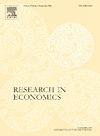Oil Price and Long-run Economic Growth in Oil-importing Developing Countries
IF 1.3
Q3 ECONOMICS
引用次数: 0
Abstract
The recent spikes in oil prices are a significant setback for the world economy, which has already faced multiple challenges due to the COVID-19 pandemic. This is particularly concerning for developing countries as maintaining a sustained growth in real GDP is crucial for lifting their population out of poverty. While the short-run negative macroeconomic effects of a spike in oil prices are well established in the context of the developed world, the long-run growth effect has received little attention, especially in developing countries. Using the World Bank's development indicators database covering the period 1990 to 2020, this study aims to investigate the oil price-growth nexus in low and middle-income net oil-importing countries to shed light on how oil price increases could be a challenge for sustainable development. Specifically, we first set up a theoretical model to establish the relationship between growth in output per capita and oil price. Following the traditional growth regression approaches, we empirically estimate the causal effect of growth in oil prices on the economic growth of 65 net oil-importing developing countries using fixed effect panel IV regression methods. The empirical results confirm statistically significant negative effects of oil prices, indicating that a higher oil price reduces long-run economic growth in oil-importing developing countries. Our results on the other determinants of growth are consistent with the existing empirical growth literature. Oil-importing developing countries, therefore, must allocate resources towards alternative domestic energy sources, in addition to pursuing fuel efficiency and conservation strategies, to mitigate the negative effects of oil price fluctuations on their long-run economic output and uphold sustainable development.
石油进口发展中国家的石油价格与长期经济增长
由于 COVID-19 大流行病,世界经济已经面临多重挑战,最近的石油价格飙升是世界经济的重大挫折。这尤其令发展中国家担忧,因为保持实际国内生产总值的持续增长对于帮助这些国家的人口摆脱贫困至关重要。虽然油价飙升对宏观经济的短期负面影响在发达国家已得到公认,但其对经济增长的长期影响却很少受到关注,尤其是在发展中国家。本研究利用世界银行 1990 年至 2020 年期间的发展指标数据库,旨在调查中低收入石油净进口国的石油价格与增长之间的关系,以揭示石油价格上涨如何对可持续发展构成挑战。具体来说,我们首先建立了一个理论模型,以确定人均产出增长与石油价格之间的关系。按照传统的增长回归方法,我们采用固定效应面板 IV 回归方法,实证估计了油价增长对 65 个净石油进口发展中国家经济增长的因果效应。实证结果证实了石油价格在统计上的显著负效应,表明石油价格上涨会降低石油进口发展中国家的长期经济增长。我们对经济增长其他决定因素的研究结果与现有的经济增长实证文献一致。因此,进口石油的发展中国家除了采取燃料效率和节约战略外,还必须将资源分配给国内替代能源,以减轻石油价格波动对其长期经济产出的负面影响,坚持可持续发展。
本文章由计算机程序翻译,如有差异,请以英文原文为准。
求助全文
约1分钟内获得全文
求助全文
来源期刊

Research in Economics
ECONOMICS-
CiteScore
1.40
自引率
0.00%
发文量
37
审稿时长
89 days
期刊介绍:
Established in 1947, Research in Economics is one of the oldest general-interest economics journals in the world and the main one among those based in Italy. The purpose of the journal is to select original theoretical and empirical articles that will have high impact on the debate in the social sciences; since 1947, it has published important research contributions on a wide range of topics. A summary of our editorial policy is this: the editors make a preliminary assessment of whether the results of a paper, if correct, are worth publishing. If so one of the associate editors reviews the paper: from the reviewer we expect to learn if the paper is understandable and coherent and - within reasonable bounds - the results are correct. We believe that long lags in publication and multiple demands for revision simply slow scientific progress. Our goal is to provide you a definitive answer within one month of submission. We give the editors one week to judge the overall contribution and if acceptable send your paper to an associate editor. We expect the associate editor to provide a more detailed evaluation within three weeks so that the editors can make a final decision before the month expires. In the (rare) case of a revision we allow four months and in the case of conditional acceptance we allow two months to submit the final version. In both cases we expect a cover letter explaining how you met the requirements. For conditional acceptance the editors will verify that the requirements were met. In the case of revision the original associate editor will do so. If the revision cannot be at least conditionally accepted it is rejected: there is no second revision.
 求助内容:
求助内容: 应助结果提醒方式:
应助结果提醒方式:


